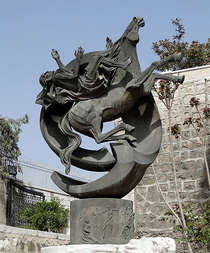 In the eyes of God our Father, pure unspoilt religion is this: coming to the help of orphans and widows when they need it, and keeping oneself uncontaminated by the world.
In the eyes of God our Father, pure unspoilt religion is this: coming to the help of orphans and widows when they need it, and keeping oneself uncontaminated by the world.
James 1:27 Afternoon reading (None)
Unlike those who sport yellow, pink, or green varieties,I am not a wearer of plastic bracelets. I have been tempted, though, by Sojourner’s WWJC? campaign and confess to donating $3 to send one to my Senate and House representatives.
While not pretending to understand national budget complexities, I do believe that many cuts proposed in the current budget before the Congress are unconscionable to those striving, however imperfectly, to follow Jesus’ teachings on caring for the least among us.
Today’s reading from Isaiah 58 poses and answers this question: Why fast when God seems oblivious to our efforts?
The answer? Our idea of fasting and God’s idea are, no surprise, not the same. Giving up chocolate, not eating between meals, or exercising more (modern equivalents of “hanging one’s head like a reed” or “lying down on sackcloth and ashes”) seem low on God’s list. Instead, Isaiah offers this list:
…Is not this the sort of fast that pleases me
it is the Lord who speaks
to break unjust fetters and
undo the thongs of the yoke,
to let the oppressed go free,
and break every yoke,
to share your bread with the hungry,
and shelter the homeless poor,
to clothe the man you see to be naked
and not turn from your own kin?”
True, we are each called to personally respond to the poor among us,even grouchy neighbors or irritating family members. And “poverty” can refer to mental illness, loneliness, and abuse as well as homelessness and hunger. As members of society, we also have the responsibility to witness to Jesus’ call to care for the poor to those in positions of power, to those who will vote on how tax dollars will be spent, or dare I mention, be raised.
Many politicians on both sides of the aisle are claiming Christian values as their guiding light when they face decisions on how to cut the deficit. Today’s readings, and the gospels together, have a common message: We are judged by how we care for the least among us. What we do for them, we do for Jesus.
While I offer a couple of links at the end of this post to provide food for thought, nothing compares to spending time prayerfully reading Scripture and sitting quietly with God, discerning how we can make a Lenten fast this year that will bring us closer to God and direct our lives to join in Jesus’ work of bringing the Kingdom.
As Isaiah reminds us:
“Then will your light shine like the dawn
and your wound be quickly healed over.
Your integrity will go before you
and the glory of the Lord behind you.
Cry, and the Lord will answer;
call, and he will say, I am here.”
© 2011 Mary van Balen
Watch the full episode. See more Religion & Ethics NewsWeekly.
Meet the Martinezes: One Family’s Reach for the American Dream
Jon Stewart and the Sheer Hypocrisy of FOX News on Teachers
by Jim Wallis 03-04-2011
Article from Reporter, official newsletter of the Lutheran Missouri Synod
 PHOTO: Mary van Balen In the morning let me know your love, O Lord.
PHOTO: Mary van Balen In the morning let me know your love, O Lord. PHOTO: Mary van Balen
PHOTO: Mary van Balen  PHOTO: Mary van Balen
PHOTO: Mary van Balen  PHOTO: Mary van Balen
PHOTO: Mary van Balen  PHOTO: Mary van Balen On February 18, Buddhists in Thailand celebrated Makha Bucha Day or Sangha Day. It commemorates the unplanned yet simultaneous appearance of 1,250 disciples before the Buddha nine months after his enlightenment. They paid him reverence and listened to him before setting out around the country to spread the teachings which became the root of Buddhism.
PHOTO: Mary van Balen On February 18, Buddhists in Thailand celebrated Makha Bucha Day or Sangha Day. It commemorates the unplanned yet simultaneous appearance of 1,250 disciples before the Buddha nine months after his enlightenment. They paid him reverence and listened to him before setting out around the country to spread the teachings which became the root of Buddhism.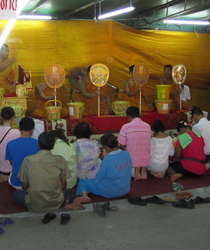
 PHOTO: Mary van Balen
PHOTO: Mary van Balen 
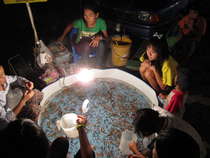
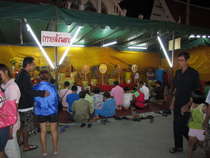 There is a variety of gifts but always the same Spirit; there are all sorts of service to be done, but always to the same Lord; working in all sorts of different ways in different people, it is the same God who is working in all of them.
There is a variety of gifts but always the same Spirit; there are all sorts of service to be done, but always to the same Lord; working in all sorts of different ways in different people, it is the same God who is working in all of them.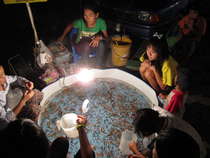 As I wandered through the temple grounds, many sights reminded me of parish festivals at home: children hoping to take a gold fish home, games, rides, and lots of food. Of course, plenty of things were different: Monks were chanting as were ever changing groups of laypeople who, after offering orange buckets filled with ordinary items for the monks daily use, knelt and joined in their prayer. No hotdogs or cotton candy, but roasted chestnuts and sweets that included sweet corn as well as chocolates.
As I wandered through the temple grounds, many sights reminded me of parish festivals at home: children hoping to take a gold fish home, games, rides, and lots of food. Of course, plenty of things were different: Monks were chanting as were ever changing groups of laypeople who, after offering orange buckets filled with ordinary items for the monks daily use, knelt and joined in their prayer. No hotdogs or cotton candy, but roasted chestnuts and sweets that included sweet corn as well as chocolates.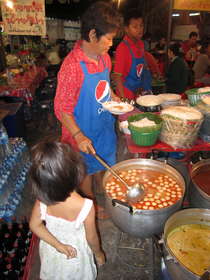 As Paul continues in 1 Cor.: “God has arranged the body and that there may not be disagreements inside the body, but that each part may be equally concerned for all the others. If one part is hurt, all parts are hurt with it. If one part is given special honour, all parts enjoy it.”
As Paul continues in 1 Cor.: “God has arranged the body and that there may not be disagreements inside the body, but that each part may be equally concerned for all the others. If one part is hurt, all parts are hurt with it. If one part is given special honour, all parts enjoy it.” 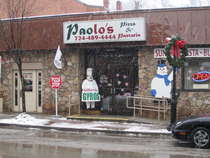
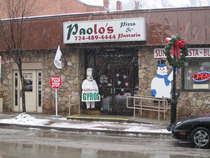 This snowy winter day found me walking the streets of Charleroi, Pennsylvania. Actually, I was doing more slipping and sliding than walking. Anyone could tell by my gingerly pace and occasional grasp at a parking meter for balance that I am basically a flatlander who, while used to messy slush, had little experience with walking through it up and down hills.
This snowy winter day found me walking the streets of Charleroi, Pennsylvania. Actually, I was doing more slipping and sliding than walking. Anyone could tell by my gingerly pace and occasional grasp at a parking meter for balance that I am basically a flatlander who, while used to messy slush, had little experience with walking through it up and down hills. 